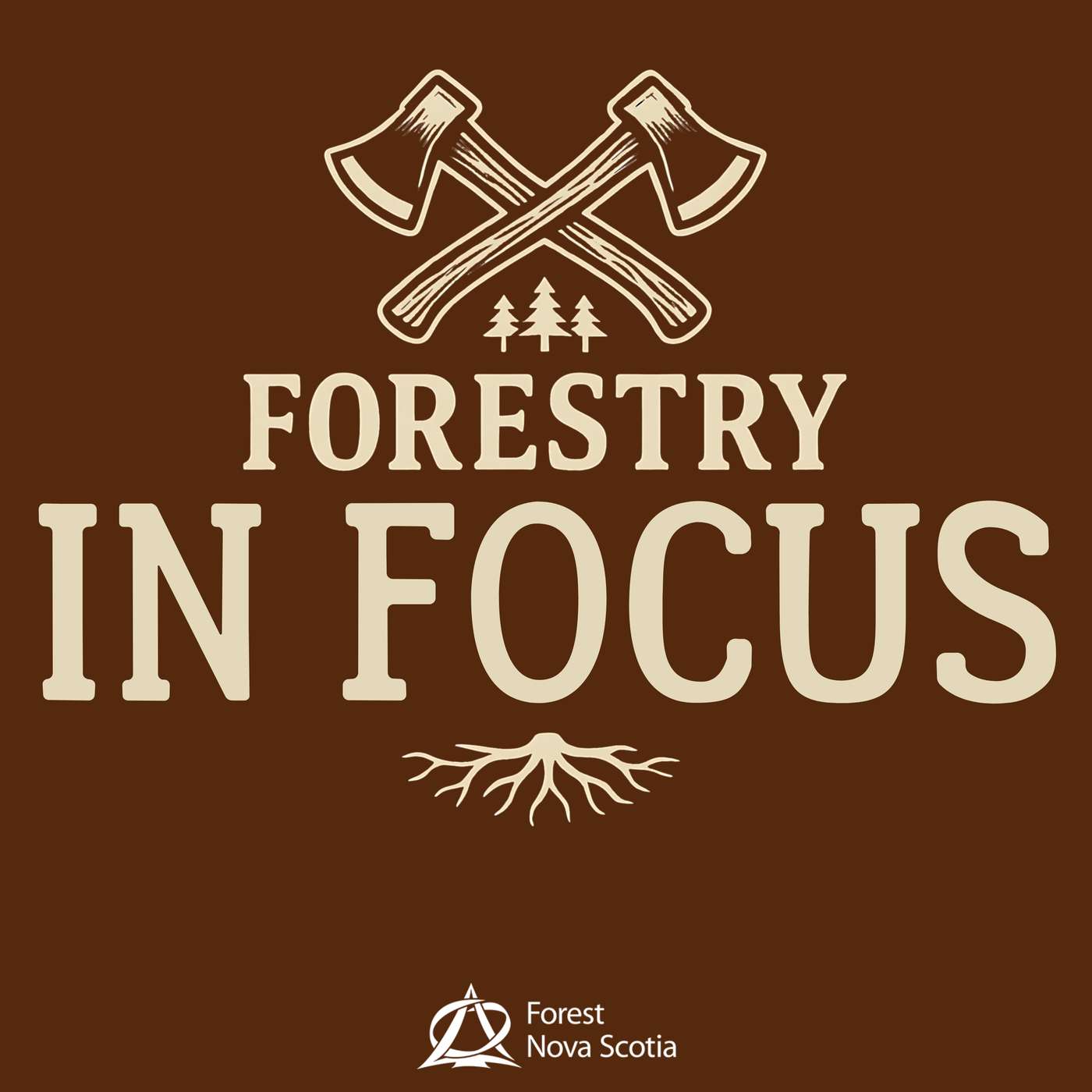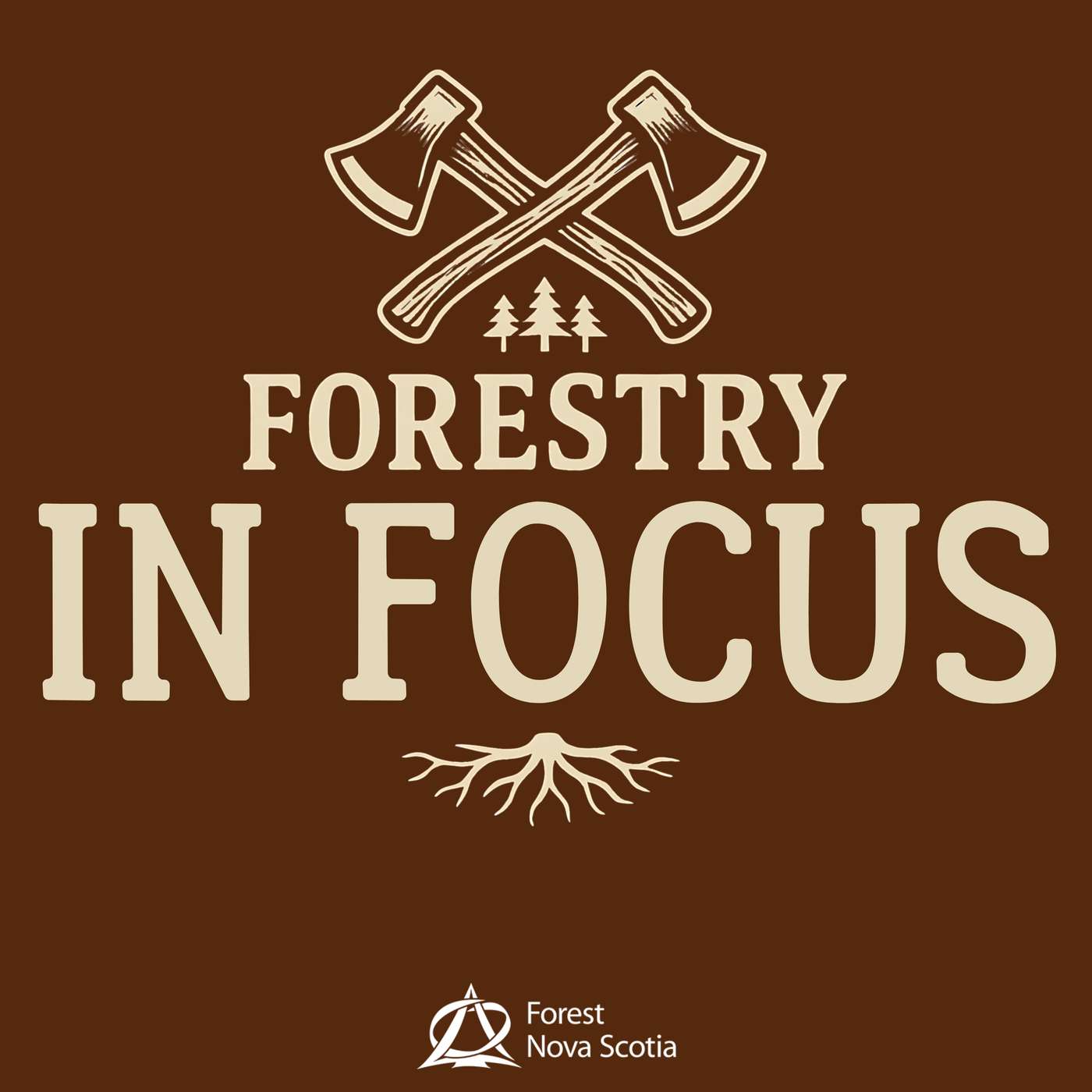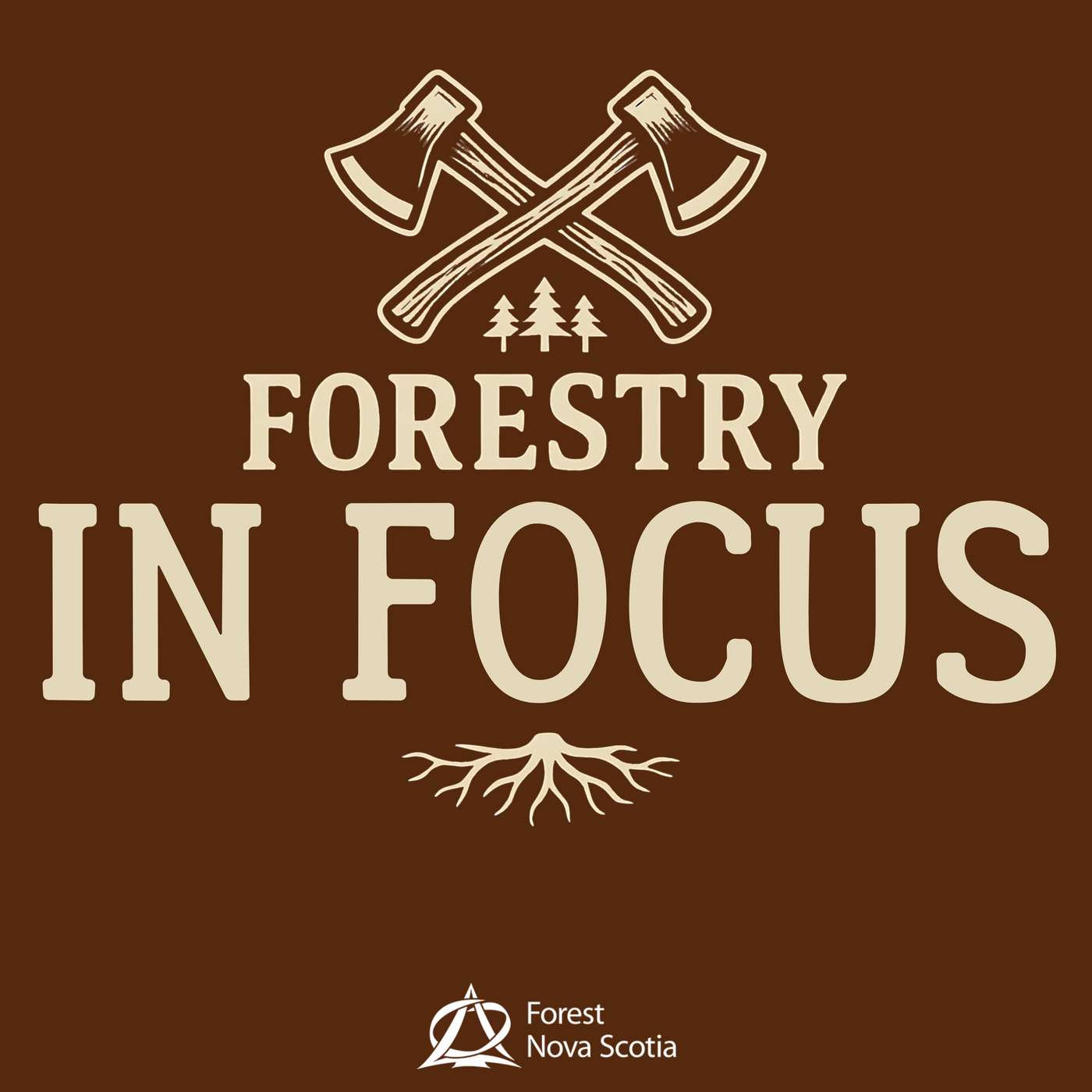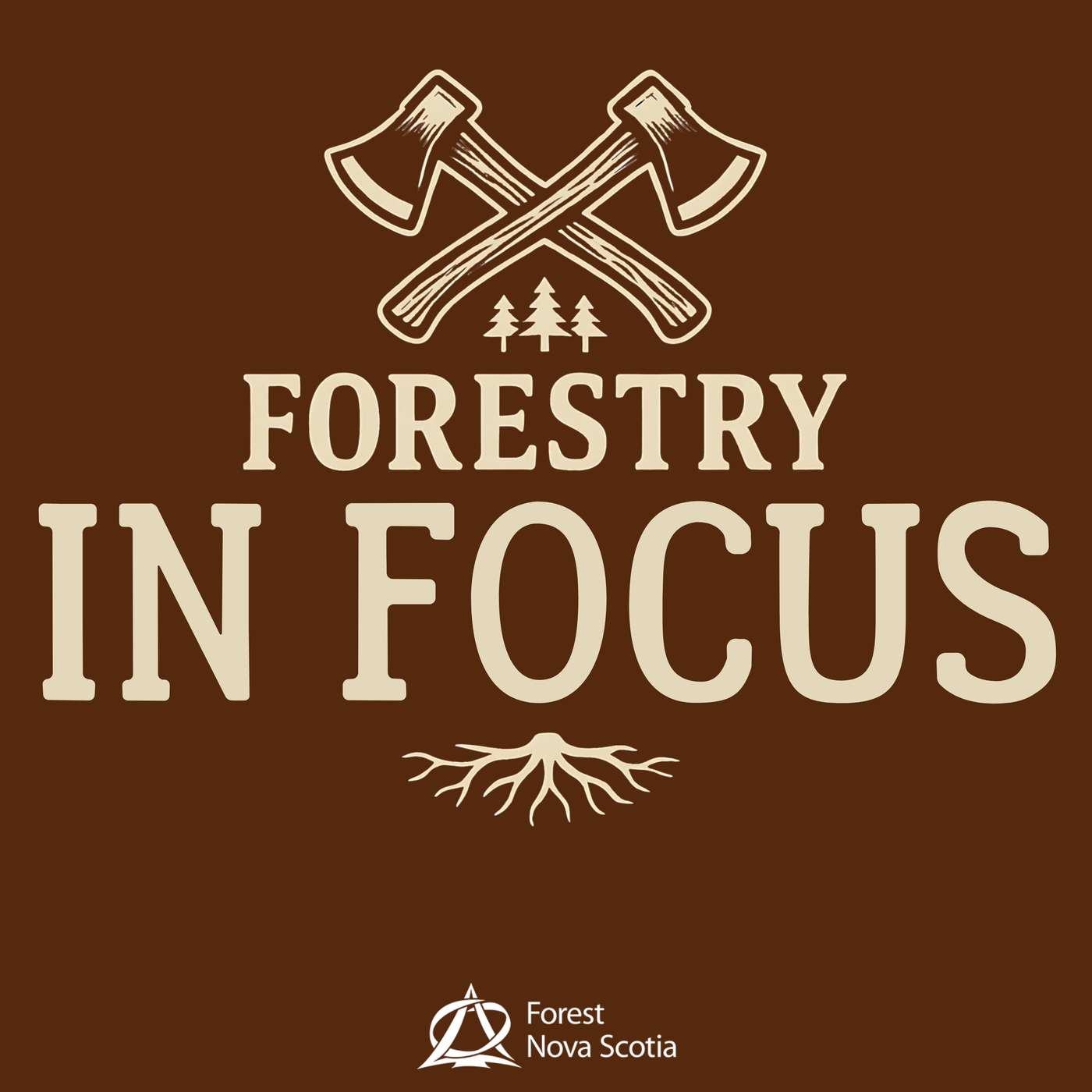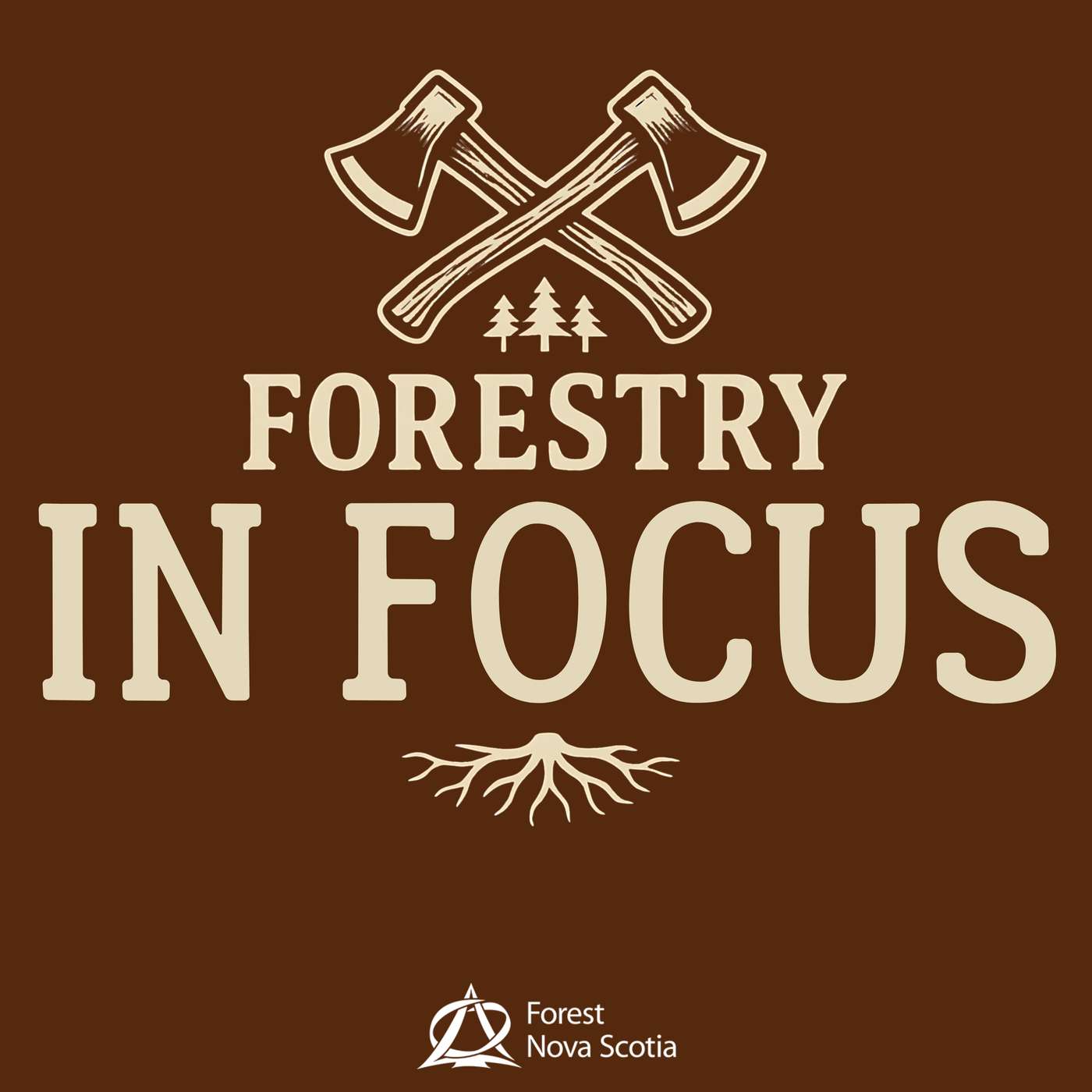Discover Forestry Uncut
Forestry Uncut

Forestry Uncut
Author: Forest Nova Scotia
Subscribed: 5Played: 45Subscribe
Share
© Forest Nova Scotia
Description
Forestry Uncut gives voice to the people, issues, and aspirations shaping forestry today, offering the public a clearer view of the industry while providing space for forestry professionals to share their stories in their own words.
A podcast dedicated to uncovering the raw truths and realities of the forestry sector, hosted by Forest Nova Scotia's Executive Director Todd Burgess.
A podcast dedicated to uncovering the raw truths and realities of the forestry sector, hosted by Forest Nova Scotia's Executive Director Todd Burgess.
25 Episodes
Reverse
When an out-of-control wildfire tore through more than 8,400 hectares in Nova Scotia’s Annapolis County, it wasn’t just a story on the news — it was in the backyards of forest workers, landowners, and entire communities. In this episode of Forestry Uncut, host Todd Burgess, Executive Director of Forest Nova Scotia, takes you inside the West Dalhousie (Long Lake) wildfire response and its aftermath.You’ll hear from:Kaitlyn Enders, Regional Forester and heavy equipment coordinator, who managed 37+ pieces of gear and multiple dozer groups on the fire line, coordinating contractors, divisions, and specialized machinery to build fire guards and support crews.Stephen Freeman, a sixth-generation sawmiller from the Freeman family on the Medway River, who shares how industry and community stepped up with equipment, crews, and expertise, and why he calls the contractors’ work “real heroism.”We explore:How Nova Scotians rallied, with contractors and community members offering equipment, skills, and time without waiting for a paycheckThe critical role of planning, training, and pre-arranged contracts for large-scale wildfire responseWhy removing ladder fuels and leftover forest debris is essential to reducing future fire riskWhat happens after the flames are out:Salvage harvesting and how mill AI can distinguish rot vs. burnThe short window to recover burnt wood before it loses valueReplanting and creating new, sustainably managed forestsHow salvaging and replanting can bring both closure to affected landowners and hope for the next generation of forestsThe West Dalhousie fire left a blackened landscape, but also a chance for recovery, renewal, and smarter preparedness. As Stephen notes, the true tragedy would be letting this forest resource go to waste instead of using it to build a healthier, more resilient forest for the future.If you’d like to learn more about Forest Nova Scotia and the work happening across the province, visit forestns.ca to explore resources, episodes, and stories from the forest sector.0:00 – Out-of-control wildfire in Annapolis County0:24 – Introducing Forestry Uncut & the West Dalhousie fire1:03 – Role of the Regional Forester & Integrated Resource Management Team1:29 – Kaitlyn as heavy equipment coordinator2:04 – 37 pieces of equipment on the line2:12 – How dozer groups fight wildfire2:41 – Forwarders, water tanks, and hose lines3:02 – Coordinating divisions and matching gear to terrain3:45 – Community offers equipment and support4:45 – Introducing Stephen Freeman & Freeman Lumber5:04 – Six generations of sawmilling & long-term sustainability5:47 – Community response and “real heroism” on the fire line7:11 – Why contractors and loggers stepped up8:25 – Looking ahead: what future fires will demand9:05 – Lessons learned: planning, training, and contractor readiness10:52 – What happens to 8,400 hectares of burned forest?11:35 – Salvage harvesting and using AI in the mill12:43 – Short window to salvage before wood loses value13:43 – Replanting, renewal, and reducing future fire risk14:29 – Closing thoughts & where to learn more (forestns.ca)LEARN MORE and become a member.
Get tickets now!Join Todd Burgess, Executive Director of Forest Nova Scotia, for a preview of the upcoming Forest Nova Scotia AGM in Halifax, Feb 3–4.Todd highlights a stacked lineup of industry leaders, innovators, and community voices—from trade and mass timber to sustainable fuels, housing, and philanthropy.Hear how the event will explore innovation & technology, economic development, education & future leaders, and community development through forestry.Learn more and get your tickets at forestns.ca.
How do we attract, train, and retain a new silviculture workforce in a system where the pay rates and support programs haven’t kept up with rising costs?In this episode of Forestry Uncut, host Todd Burgess speaks with Dennis Bedford and Tina McCauley of D. Bedford Forestry Services, a silviculture company based in Chester Grant, Nova Scotia. They share how they’re tackling one of the biggest challenges in the forestry sector: attracting and retaining skilled workers.Dennis and Tina explain:What silviculture really is, from tree planting and spacing to pre‑commercial thinning.Why “farming trees” is essential for forest health, fire resilience, and carbon capture.How stagnant silviculture rates and rising costs make it hard for workers to earn a decent wage.Their innovative model: providing all the gear, paying above minimum wage during training, and focusing on high school athletes and co‑op students.How partnerships with Forest Heights Community School, the O2 program, and local supporters like Hughes Diesel in New Ross are creating a pipeline of motivated young workers.Why their teen crews are not just learning tree ID and spacing, but also work ethic, independence, and leadership.They also discuss:The barriers they’ve faced accessing government supports and subsidies, especially with 16‑year‑old workers.Their vision for silviculture as a recognized trade, with clear training paths and mentorship.How better silviculture practices can support biodiversity, protect old growth, and act as a buffer against wildfires and insect outbreaks.If you care about the future of forestry, youth employment, or climate-resilient forests, this conversation offers a hopeful, ground-level view of what change can look like.0:00 – Intro: Why Silviculture MattersTodd frames silviculture, healthier trees, and introduces the guests.0:40 – Meet Dennis and Tina of D. Bedford Forestry ServicesBackground on their company and roles in Nova Scotia forestry.1:36 – What Is Silviculture, Really?Dennis explains tree planting, spacing, and pre-commercial thinning.2:32 – Farming Trees vs. Letting Them Grow WildWhy active management creates better wood and protects old growth.3:40 – A Shrinking Workforce and Stagnant RatesDennis outlines economic pressures and the training gap.5:06 – Can Silviculture Workers Earn a Living?Discussion of piece rates, minimum wage, and rising costs.6:20 – Rethinking Who to Hire: From Students to TeensPivot from university students to recruiting high school athletes.7:56 – Building Careers, Not Just Summer JobsCreating long-term forestry paths and “boots on the ground” experience.9:29 – Community Roots: Schools and Local SupportersForest Heights Community School, co‑op teachers, and Hughes Diesel.11:08 – Removing Barriers: Gear, Wages, and FitProviding equipment, paying above minimum wage, and hiring for attitude.13:12 – Retention Wins and The Power of Peer GroupsHow 16–17-year-olds, teams, and healthy competition improve retention.14:45 – Co‑op and O2 Programs Feeding the PipelineHow high school co‑ops and guaranteed NSCC seats support forestry careers.16:40 – Training Through Real Work on the LandWhat “cutting” means, target spacing, and species selection.18:10 – Practical Life Skills and Career OptionsFrom mentor roles to other silviculture companies and tree planting.20:00 – Can This Model Scale? Mentors and a Training PathwayVision for mentors, instructors, and silviculture as a recognized trade.22:20 – Hitting the Wall on Subsidies and SupportsWhy existing programs don’t fit 16-year-olds and their “new box” idea.24:20 – Why They Keep Going: Hope in ForestryDennis’s outlook on silviculture, aging workers, and retirement realities.25:30 – Silviculture, Wildfires, and InsectsHow healthier, managed forests improve fire resilience and pest resistance.27:00 – Biodiversity, Not MonocultureTeaching species ID and maintaining diverse forests.28:20 – Fire Buffers and Protecting Old GrowthUsing silviculture strategically around old growth forests.29:10 – Closing Thoughts and Call to ActionThanks, optimism, and where to learn more about Forest Nova Scotia.LEARN MORE and become a member.
Todd Burgess, Executive Director of Forest Nova Scotia, extends holiday greetings and expresses hope for the forestry sector's future. A big thank you to the staff for their efforts in organizing events and producing the podcast, to the trust of Forest Nova Scotia members and the guidance of the board of directors. And gratitude to collaborative partners from the provincial government, elected officials, and nonprofit organizations. And don't forget the annual general meeting in Halifax in February 3 - 4, 2026To learn more about the forestry sector or Forest Nova Scotia, visit forestns.ca.
Exploring viable solutions through economic Opportunities and prosperity in the forestry sector. In this episode of Forestry Uncut, host Todd Burgess (Executive Director, Forest Nova Scotia) sits down with Kevin Merriam, Executive Director of the Maritime Lumber Bureau, and Patrick Crabbe, CEO of The Mass Timber Company.They explore how Atlantic Canada’s forestry sector can move “from tree to city” through mass timber, panelized and modular construction, and other value‑added wood products. The conversation covers:The current challenges in the sawmilling sector, including U.S. tariffs and dutiesHow mass timber and prefabricated wood systems can help address the housing crisisWhy Atlantic Canada’s spruce‑pine‑fir lumber is stronger than previously published valuesThe role of government policy (like Nova Scotia’s wood‑first policy) in growing domestic wood constructionSuccess stories from companies like East Cut, Dora Construction/MacLellan Group, and others innovating with woodIf you’re a forestry professional, developer, architect, engineer, policymaker, or landowner wondering how wood can play a bigger role in housing and infrastructure, this episode is for you.Subscribe to stay updated on future episodes of Forestry Uncut, and learn more about Forest Nova Scotia at forestns.ca.00:00 – Opening thoughts: Adversity and opportunity in forestry00:31 – Todd introduces Forestry Uncut and today’s guests01:22 – Kevin’s background and path to the Maritime Lumber Bureau02:39 – From inspector to executive director: Kevin’s career progression03:32 – Patrick’s roots in a family sawmill business05:55 – 2008 downturn, receivership, and Patrick’s pivot to mass timber07:35 – WoodWORKS and early work on mass timber and building codes08:49 – Founding The Mass Timber Company and project status09:36 – “Tree to city”: A circular, fully integrated wood economy10:29 – Nova Scotia’s wood‑first policy and early market activity12:03 – Hidden value chain: Why landowners don’t see the full picture12:47 – State of the sawmilling sector and U.S. tariffs/duties14:36 – Why develop domestic markets? Origins of Atlantic WoodWORKS15:39 – Why mass timber took so long to arrive in Atlantic Canada17:00 – Strength testing Atlantic SPF and the “aha” moment19:13 – “We’ve veiled the gold”: Realizing the true value of the wood basket20:10 – Beyond mass timber: Panelized and modular wood systems21:55 – Wood, cost‑effectiveness, codes, and speeding up housing delivery23:38 – How developers can engage WoodWORKS and technical teams23:48 – Prefab vs volumetric modular – where mass timber fits26:13 – Case study: Crosswoods project and exposed mass timber floors28:13 – How much Nova Scotia lumber could mass timber actually use?29:25 – 7–20x value: Increasing value per cubic metre of wood30:13 – Emerging Atlantic companies: East Cut, Atlas, truss manufacturers31:29 – Perfect storm: Market disruption and local circular solutions35:07 – Forestry’s role in affordable housing: Call for government–industry dialogue36:18 – Who needs to be at the table? Municipal, provincial, federal36:59 – Closing thoughts and call to action for collaboration37:30 – Outro: About Forest Nova Scotia and where to learn moreLEARN MORE and become a member.
In this episode, we’re joined by Derek Nighbor, President and CEO of the Forest Products Association of Canada, who offers an inside look at the tough challenges and bold opportunities shaping Canada’s forestry sector today.Derek takes us through the complexities of trade tensions with the United States, revealing how tariffs, shifting policies, and a changing global landscape have impacted thousands of jobs and entire communities across Canada. He shares the importance of unified advocacy, government partnerships, and building strong, solution-focused relationships with environmental groups to drive both industry and environmental progress.Throughout our conversation, we explore how Canadian forestry is finding new life through innovation, like biomass energy and modular mass timber, and seizing opportunities in export markets abroad. Derek provides thoughtful insights on why collaboration, openness to new ideas, and resilience are key to moving the sector from managing decline to renewed growth.We also examine the vital role of sustainability, community support, and hope for a future where Canada’s forests continue to fuel prosperity for generations to come, making this episode essential listening for anyone invested in the future of forestry.To learn more about the forestry sector or Forest Nova Scotia, visit forestns.ca.
In this episode, we’re joined by Spencer Coulstring of Freeman Lumber, whose journey from science communications to passionate forestry advocate highlights the evolving face of Nova Scotia’s forest sector.Spencer shares her unique pathway into forestry, from species conservation in British Columbia to building a career and community back home in Nova Scotia. Throughout the conversation, we dive into the power of mentorship and inclusion, exploring how groups like Women in Woods are breaking barriers, creating safe spaces, and redefining what it means to succeed in a traditionally male-dominated field.Together, we tackle public perception and the role of education in shaping the next generation’s view of forestry. Spencer provides insights on inspiring youth, the changing demands of the sector, and the importance of supporting one another, especially women, as the industry seeks greater diversity and resilience.We also uncover the challenges and hopes for a more sustainable, welcoming forestry sector, making this episode a must-listen for anyone invested in the future of the industry.To learn more about the forestry sector or Forest Nova Scotia, visit forestns.ca.
This week on Forestry Weekly News: -Government of Nova Scotia cabinet shuffle and new minister.- Shannon Park as a part of 13 Billion Build Canada Homes project.- Forest Project Association of Canada national policy convention in Ottawa. - Our trees campaign HRM tree planting.- Industry Workforce Training Needs study by the Forestry Sector Council.To learn more about the forestry sector or Forest Nova Scotia, then visit our forestns.ca.
In this episode, we’re joined by George Ernst, CFO and controller at Freeman Lumber, one of Nova Scotia’s oldest and most respected lumber producers. George, a fourth-generation forester, shares both professional expertise and personal stories from his family’s longstanding involvement in the industry.Together, we dive into the dramatic impact of the new 10% tariffs on Canadian softwood lumber, examining how these measures ripple beyond headlines to affect local sawmills, communities, and family-run businesses throughout Nova Scotia. George breaks down the financial realities facing mills today, explains the unique position of Nova Scotia in the North American softwood trade, and lays out why federal support isn’t easily accessible for the province’s operators.We also tackle the high cost of crown land, the evolving demands of forestry management, and the urgent need for efficiency in a tough export environment. George issues a call for intentional action from both industry and government on the concrete solutions needed to keep Nova Scotia’s forestry sector competitive and sustainable into the future.To learn more about the forestry sector or Forest Nova Scotia, visit forestns.ca.
This week on Forestry Weekly News:- Forest sector faces 45% tariffs, urgent action required by government and the forest sector. - The wood ban restriction lifted in Annapolis valley as of October 15th. - US Tariffs' impact on the Christmas tree industry.- Wrapping up our trees, Come see us at the Wolfville Farmer's Market.-The Forest Products Association of Canada 2025 Policy Conference in Ottawa next week, stay tuned for more details. To learn more about the forestry sector or Forest Nova Scotia, then visit our forestns.ca.
In this episode, we sit down with Sean Meister, President and CEO of Global Bluenosers, to explore his remarkable journey from growing up in a multi-generational forestry family in rural Nova Scotia to building a global network of Nova Scotians passionate about giving back to their home province. Sean shares insights on the values and lessons learned in the woods, the challenges and changes facing the forestry sector, and how his experiences inspired him to connect Nova Scotians around the world. Together, we discuss the importance of sustainable forestry, community resilience, and the power of global connections to shape a brighter future for Nova Scotia.To learn more about the forestry sector or Forest Nova Scotia, then visit our forestns.ca.
This week on Forestry In Focus Weekly News:- Forest Nova Scotia was a sponsor and attended the Nova Scotia Forestry Festival at Lake Charlotte last weekend- Forest Nova Scotia also sponsored the Nova Scotia Lumberjack Championships last weekend- Many forestry professionals attended the Canadian Woodlands Fall Conference in Truro on October 8-9th. - The timber Loan Board has just announced changes to their regulations that give more options Forestry Businesses- 2025 Fall Symposium on Growing Exports in Nova Scotia- Forest Nova Scotia - Our Trees Campaign, Experiential Learning - School Assembly at Holland Road Elementary, Friday October 10To learn more about the forestry sector or Forest Nova Scotia, then visit our forestns.ca.
This week on Forestry In Focus Weekly News: - New Tariffs announced by the White House that impact CUSMA compliant trade, which includes softwood lumber from Nova Scotia- Late breaking wildfire near Lake George started on Monday. Upwards of 275 civic addresses are under an evacuation order- The situation on Hunter’s Mountain has triggered a bigger debate about how to handle conflicts about forest management with the Miq’maw.To learn more about the forestry sector or Forest Nova Scotia, then visit our forestns.ca.
Myths and realities in forestry management.Join us as we dive deep into the realities of forestry management in Nova Scotia, focusing on the use of herbicides as a tool for sustainable growth. Hear from silviculture contractor Alex Feix and woodlands manager Rick Archibald as they share personal stories, discuss regulatory challenges, and address public concerns. From death threats and protests to the on the ground reality of herbicide application, this episode sheds light on the complexities, misconceptions, and future of forest stewardship. Whether you’re a forestry professional or curious listener, you’ll gain a deeper understanding on what it takes to grow healthy forests for generations to come.To learn more about the forestry sector or Forest Nova Scotia, then visit our forestns.ca.
This week on Forestry Weekly News:-Forestry’s third annual Our Trees Campaign has been active this month, starting at the Bridgewater Farmer’s Market and continuing in Clayton Park, Truro Stampede, Truro Farm Market, and Antigonish.-Acadian Timber announces $2.5 million to the UNB Faculty of Forestry for digital transformation. -Deep insights into the bioenergy sector. Scientists, professors and CEOs of companies from around the world came together to talk about decarbonization and how low quality wood residues from forestry operations and sawmill residues can help us through our energy transition.To learn more about the forestry sector or Forest Nova Scotia, then visit our forestns.ca.
Forestry Uncut gives voice to the people, issues, and aspirations shaping forestry today, offering the public a clearer view of the industry while providing space for forestry professionals to share their stories in their own words. A podcast dedicated to uncovering the raw truths and realities of the forestry sector, it releases weekly and is hosted by Forest Nova Scotia's Executive Director Todd Burgess.
In this episode, host Erin Trafford talks with FNS Interim Executive Director Todd Burgess about the positive changes and opportunities emerging within Nova Scotia’s forestry sector. Todd emphasises new projects, like sustainable bioenergy and aviation fuel initiatives, that are creating value from low-quality wood. These examples showcase how forestry can contribute to sustainable development and climate change mitigation. He reflects on the sector's revitalization and the increasing membership. Erin and Todd discuss the importance of engaging both rural and urban communities to strengthen support and understanding of forestry's impact.Key Takeaways:Nova Scotia’s forestry sector is experiencing growth and innovation.New initiatives include bioenergy plants, sustainable aviation fuel projects, and district heating systems.Forest Nova Scotia's membership is rising as more woodlot owners recognize opportunities.Engaging urban communities is crucial for expanding forestry’s reach and impact.The forestry sector aims to shift towards self-sustainability without relying on government support.Forest Nova Scotia is the largest forestry organization in the province. Members include woodlot owners, sawmills, contractors and pulp and paper companies. Find out more about us and what we do at www.forestns.ca. Facebook: https://www.facebook.com/forestnovascotia/LinkedIn: https://www.linkedin.com/company/forest-nova-scotia/?originalSubdomain=ca
In this episode, we explore the pull of Nordic culture and its advanced forestry technologies. The Finns are the rockstars of forestry, and are shaping the future of sustainable forestry. Erin discusses the differences and potential collaborations between Canada and Nordic countries, emphasizing the importance of innovation, market development, and sustainable practices in the forestry industry. *Note to listener: Since the recording of this episode Stephen Moore is no longer the Executive Director of Forest Nova Scotia. Key Takeaways:Nordic Influence and Innovations:Nordic countries, like Finland, lead in sustainable forestry practices and innovative technologies such as unmanned airships and LiDAR, which provide detailed forest data.Jiri Jormakka from Finland highlights the advanced data collection and processing capabilities of airships, which can classify forest species and conditions down to a square inch. Canada's Forestry Market:Canada has vast forests but lacks the market development and cohesive value chains seen in Nordic countries.Jamie Stephen of Torchlight Bioresources points out that Canada's forestry industry can learn from Nordic countries' focus on climate leadership and energy security.Collaboration and Learning:Finnish delegates emphasize the importance of trust and cooperation across the entire forestry value chain, a key aspect Canada could adopt.There are opportunities for collaboration, such as Nova Scotia’s new trade partnership with Finland, to enhance local forestry practices and market growth.Innovative Solutions and Challenges:Stephen Moore advocates for leveraging local resources and creating community-owned infrastructure to benefit the economy and environment.Jamie Stephen discusses innovative solutions like offshore CO2 storage and the integration of wind and bioenergy, drawing parallels to successful Nordic models.Guests:Jaime Stephen, PhD: Managing Director, TorchLight Bioresources www.torchlightbioresources.comJiri Jormakka: COO Kelluu https://kelluu.com/ -------------------------Forest Nova Scotia is the largest forestry organization in the province. Members include woodlot owners, sawmills, contractors and pulp and paper companies. Find out more about us and what we do at www.forestns.ca. Facebook: https://www.facebook.com/forestnovascotia/ LinkedIn: https://www.linkedin.com/company/forest-nova-scotia/?originalSubdomain=ca
In this episode, we take a closer look at Ledwidge Lumber in Enfield, Nova Scotia. The family-run sawmill challenges common assumptions about forestry, showcasing a blend of tradition and innovation. *Note to listener: Since the recording of this episode Stephen Moore is no longer the Executive Director of Forest Nova Scotia.Key Takeaways:Family Heritage and Community Impact: Ledwidge Lumber, started by Cassie Turple’s grandfather, has grown into a significant local employer. The mill's walls are adorned with family photos and community contribution certificates, highlighting its deep-rooted connection to Enfield.Resilience and Renewal: The mill has faced and overcome two devastating fires, embodying the forestry principles of rebuilding and renewal. The company now plans to expand with a biofuel plant, creating new jobs and tapping into renewable energy sources.Technological Integration: The mill employs advanced technology, including AI and high-tech software, to maximize efficiency and wood recovery. This modernization has shifted jobs from manual sorting to specialized, higher-paying positions.Market Challenges and Solutions: Despite most of their product being exported to the U.S. due to limited local demand, Ledwidge Lumber is pioneering the production of mass timber. This move aims to create new markets within Nova Scotia, reducing reliance on distant suppliers.Future Prospects: The episode ends with a sense of optimism about the future of forestry in Nova Scotia. The planned biofuel plant and mass timber production are seen as steps toward a more sustainable and self-sufficient forestry industry.Guest: Cassie Turple: Communications/HR Manager Ledwidge Lumber https://www.ledwidgelumber.com/-------------------------Forest Nova Scotia is the largest forestry organization in the province. Members include woodlot owners, sawmills, contractors and pulp and paper companies. Find out more about us and what we do at www.forestns.ca. Facebook: https://www.facebook.com/forestnovascotia/LinkedIn: https://www.linkedin.com/company/forest-nova-scotia/?originalSubdomain=ca
In this episode, we tap into the primal connection humans have with forests and fire, exploring how our narratives around forestry and wood burning have evolved. And how looking at this primal connection to fire can lead to innovative solutions to modern day challenges. We chat with Robin Barrett, a small woodlot owner near Halifax, about his dedication to work in forestry, despite the challenges. The discussion highlights the benefits of firewood, particularly for low-income seniors, and the primal satisfaction of burning wood. Former Forest Nova Scotia Executive Director Stephen Moore* joins us to discuss the critical importance of heat in Canada and how bioenergy can address both environmental and economic issues. Jamie Stephen, Managing Director of Torchlight BioResources, provides insights into Canada’s heat consumption and the potential of bioenergy as a sustainable solution. *Note to listener: Since the recording of this episode Stephen Moore is no longer the Executive Director of Forest Nova Scotia.Key Takeaways:Primal Connection: Humans have an instinctual draw to fire and forests, deeply rooted in our history and survival.Economic and Environmental Benefits: Burning wood for heat is a cost-effective, environmentally friendly solution, especially for low-income and senior populations.Bioenergy Potential: Canada, with its high heat consumption, should look to Nordic countries for bioenergy solutions that promote local economies and reduce reliance on imported fuels.Policy and Implementation Challenges: Current policies and grid infrastructure are inadequate for the needed transition to bioenergy, requiring a shift in focus from unproven technologies to proven bioenergy solutions.Guests:Robin Barrett: Small Woodlot Owner, https://www.barrettfirewood.ca/Jamie Stephen, PhD: Managing Director, TorchLight Bioresources www.torchlightbioresources.com-------------------------Forest Nova Scotia is the largest forestry organization in the province. Members include woodlot owners, sawmills, contractors and pulp and paper companies. Find out more about us and what we do at www.forestns.ca. Facebook: https://www.facebook.com/forestnovascotia/LinkedIn: https://www.linkedin.com/company/forest-nova-scotia/?originalSubdomain=ca


